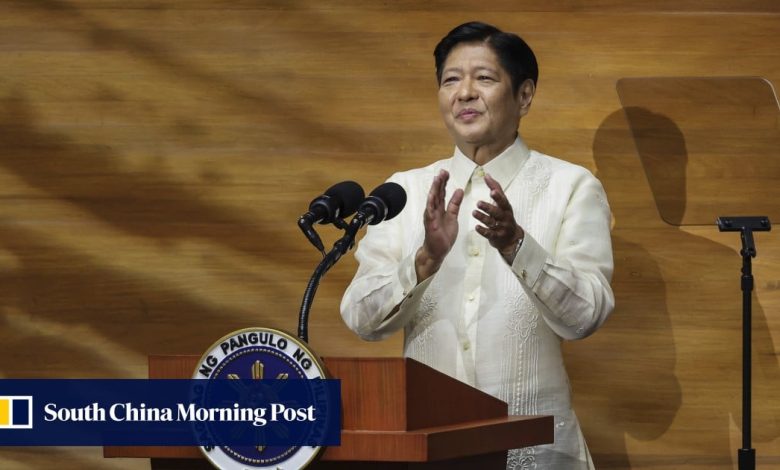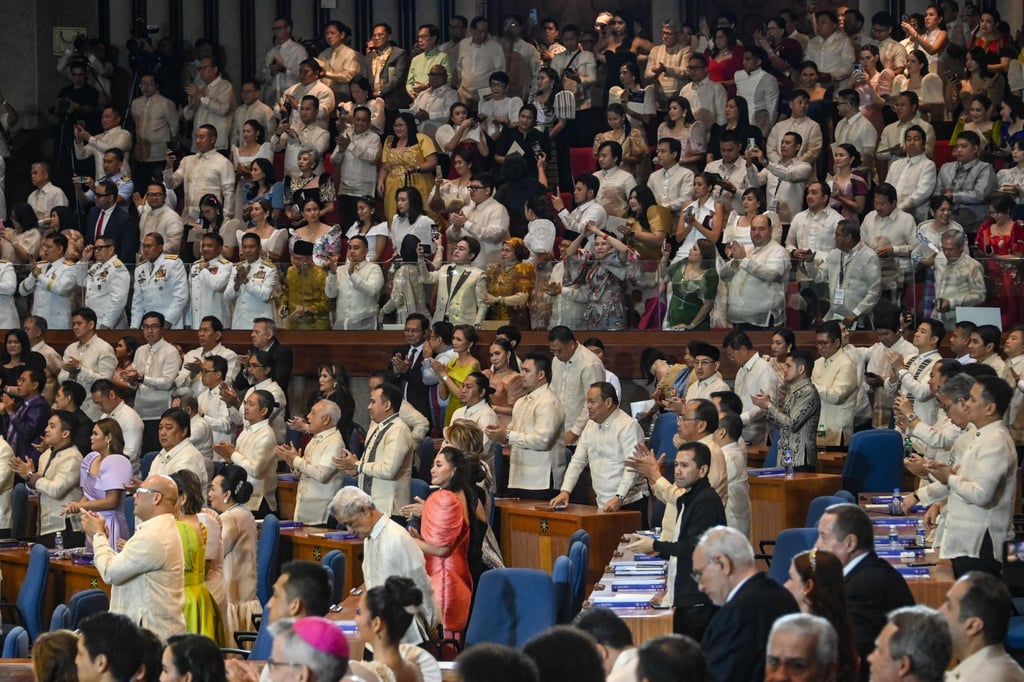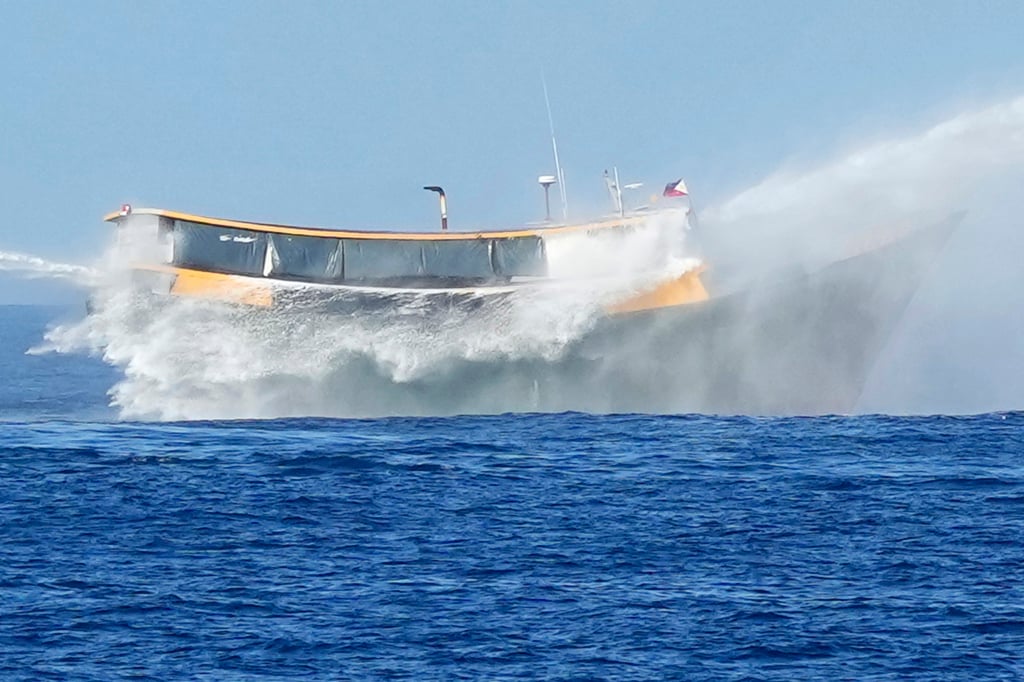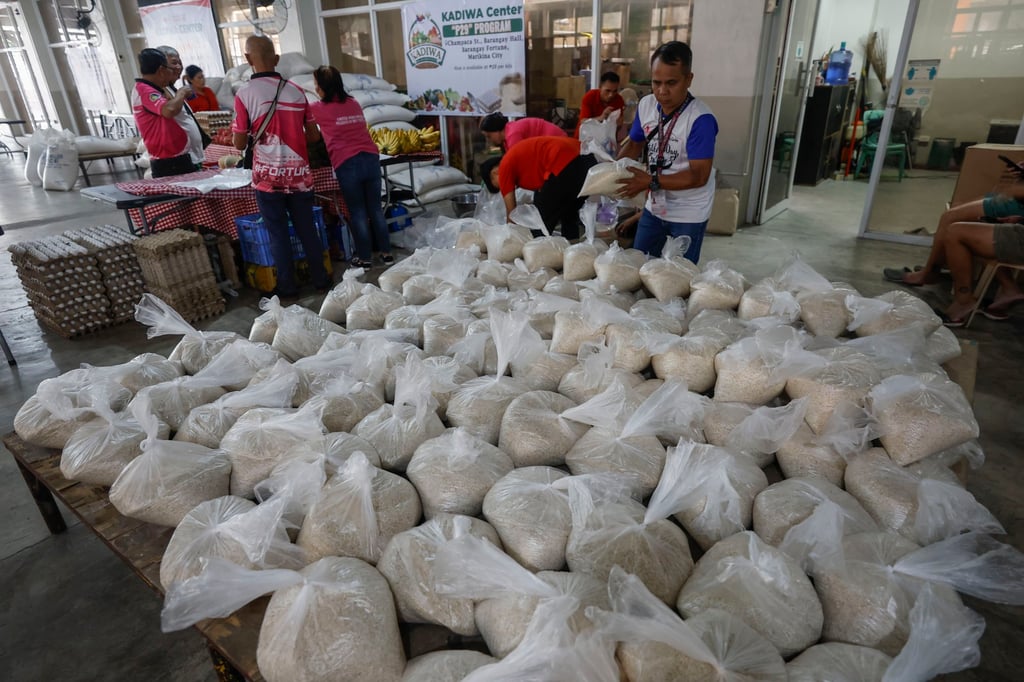How did Philippines’ Marcos Jnr fare in his State of the Nation Address?

“The Pogos ban and the flag-waving for WPS certainly won him [political] points. The Pogos ban in particular was a brilliant piece of both political theatre and gamesmanship,” said Gutierrez, a former spokesman for ex-vice-president Leni Robredo.
The West Philippine Sea is a region within the disputed South China Sea that the Philippines considers its maritime territory.

Marcos Jnr’s third Sona speech came amid a drop in his trust ratings and popularity, as tracked by independent poll bodies.
Retired Supreme Court associate justice Antonio Carpio told This Week in Asia he was “satisfied” with the speech. “Yes, he addressed the WPS in his Sona. I’m satisfied with his statement on the WPS.”
Marcos Jnr devoted nine paragraphs to the issue, saying “the Philippines cannot yield. The Philippines cannot waver”.
He added: “We continuously try to find ways to de-escalate tensions in contested areas with our counterparts, without compromising our position and our principles. I know that our neighbours too are doing their best to make this work.”
He noted that in 2026, the country would chair and host the Asean summit and “peace and community-building will always be our clarion call”.
The Philippines and China have been locked in a months-long territorial row in the South China Sea, with clashes between vessels from both sides becoming increasingly violent.
Marcos Jnr did not go into specifics but outlined broad strategies in dealing with the maritime issues, such as strengthening the country’s defensive posture “both through developing self-reliance and through partnerships with like-minded states”, education of the young on the issue and through the enactment of laws to protect the country’s maritime zones.
He also thanked the military, coastguard and Filipino fishermen in the West Philippine Sea for their sacrifices – a gesture that earned him cheers and a standing ovation.

Lucio Blanco Pitlo, a member of the board of directors of the Philippine Association for Chinese Studies, told This Week in Asia that despite Marcos Jnr’s firm stance on the West Philippine Sea issue, he “remains committed to diplomacy” by pushing for proper diplomatic channels and mechanisms to settle disputes.
“This message can provide a basis for further steps to de-escalate maritime tensions,” Pitlo said.
The closure of Pogos “may also offer a chance to improve frayed bilateral ties”, with Beijing long having urged Manila to wind down the industry that “caused social ills” in China where gambling is illegal, Pitlo added.
Why ban Pogos
Gutierrez said the president might have had political reasons for imposing the ban – because the camp of his predecessor Rodrigo Duterte had close ties to Pogos and could be benefiting from them.
Duterte’s former spokesman, Harry Roque, was accused during a July 10 Senate investigation of being a “legal counsel” to a Pogo raided in June and allegedly found to have committed torture and human trafficking.
Gutierrez said Marcos Jnr was “hitting multiple objectives with just one bold move” as the emerging Duterte links were “just too attractive of a package” for the president not to include in his speech.
Lawmakers recently warned that Pogo operators could sway the results of next year’s midterm elections.

The pronouncement, however, could mean political trouble for Marcos Jnr in one of the country’s vote-rich areas, Cavite. The province has long been controlled by the Remulla family, who delivered a landslide win for Marcos Jnr in 2022.
The family had “sold” its former island resort and the new owners have turned it into “Pogo island” for online gaming. The current Remulla patriarch, Juan Crispin, is Marcos Jnr’s justice secretary.
“The ban loses all credibility if an exception is carved out for allies. So that will be a test of the president’s political will, as well as the loyalty of his Remulla allies,” Gutierrez said.
‘No concrete plans’
While Marcos Jnr won praise for the West Philippine Sea and Pogos issues, his other pronouncements were more subdued.
The president touched on the “key points” addressing food inflation, such as uplifting the economy through infrastructure spending, job creation, transport and connectivity, but “failed to mention when will we get there”, said Jonathan Ravelas, managing director of e-Management for business and marketing services and retired chief market strategist of the Philippines’ largest bank, BDO.
Fermin Adriano, former undersecretary for policy, planning and research at the Department of Agriculture, said the president only called for “environmentally resilient measures” to minimise the impact of El Nino and La Nina, but offered “no concrete plans on how to significantly increase agricultural productivity”.

Marcos Jnr’s speech also blamed “market forces” and “climate change” for the high prices of food and other essential items.
Critics said Marcos Jnr failed to mention a campaign promise to bring down rice prices, with the president instead touting how he had raised rice productivity in 2023 to more than 20 million tonnes.
According to a January 30 report by the Philippine News Agency quoting the Department of Agriculture, palay (grain harvest) increased to 20.06 million metric tonnes last year, a slight boost from the 19.96 million metric tonnes in 2021.
Human Rights Watch senior researcher Carlos Conde criticised the president’s pronouncement that his “bloodless war on dangerous drugs” was succeeding and adhering to humane methods which did not include “extermination”.
Conde told This Week in Asia on Monday that Marcos Jnr’s claim was “spurious and baseless”. He cited data from the University of the Philippines’ Third World Studies Centre that “more than 700 have been killed under him [Marcos Jnr] so far and that the killings worsened in the past year compared to the year before”.
“By rattling off ‘successes’ in his anti-illegal drug campaign, he’s effectively doubling down on the campaign. That can only mean … the killings will continue, probably even worsen,” Conde said.





